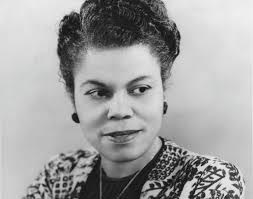Estelle Massey Osborne
Estelle Massey Osborne (1901–1981) was a pioneering African American nurse who made significant contributions to the nursing profession in the United States. She was the first African American woman to earn a Master's degree in nursing. Throughout her career, Osborne worked tirelessly to break down racial barriers in nursing education and practice, advocating for equal opportunities for African American nurses.
Early Life and Education[edit | edit source]
Estelle Massey was born in 1901 in Palestine, Texas, to a family that valued education and encouraged her to pursue her academic interests. Despite the racial and economic challenges of the time, Osborne pursued higher education with determination. She completed her initial nursing training at Provident Hospital’s School of Nursing in Chicago, Illinois, one of the few nursing schools that accepted African American students at the time.
After working as a nurse for several years, Osborne recognized the need for further education to advance her career and advocate for African American nurses. She was awarded a scholarship from the Rosenwald Fund, which she used to attend Teachers College, Columbia University in New York City. In 1931, she earned her Master's degree, becoming the first African American woman to achieve this milestone in nursing.
Career and Advocacy[edit | edit source]
Osborne's career was marked by her relentless advocacy for the integration of African American nurses into the mainstream nursing profession. She held various positions that allowed her to influence nursing education and practice. Osborne served as an instructor and later as the director of nursing at Harlem Hospital in New York City. Her leadership at Harlem Hospital was instrumental in improving the standards of nursing care and education.
In addition to her work at Harlem Hospital, Osborne was actively involved in the National Association of Colored Graduate Nurses (NACGN), where she served as president from 1934 to 1935. Under her leadership, the NACGN worked towards the integration of African American nurses into the American Nurses Association (ANA), a goal that was eventually realized in 1948.
Osborne also played a key role in the establishment of the United States Cadet Nurse Corps during World War II. She worked with government officials to ensure that the program was accessible to African American nursing students, thereby expanding opportunities for African American women in the nursing profession.
Legacy[edit | edit source]
Estelle Massey Osborne's legacy is one of perseverance, leadership, and advocacy for equality in the nursing profession. Her efforts paved the way for future generations of African American nurses. In recognition of her contributions, the ANA established the Estelle Massey Osborne Scholarship, which supports African American nurses pursuing graduate education.
Osborne's work has been recognized posthumously with numerous awards and honors, including induction into the American Nurses Association Hall of Fame and the National Women's Hall of Fame.
Conclusion[edit | edit source]
Estelle Massey Osborne's pioneering efforts not only broke down racial barriers within the nursing profession but also set a precedent for the importance of advanced education for nurses. Her dedication to equality, education, and excellence in nursing continues to inspire nurses and healthcare professionals to this day.
Search WikiMD
Ad.Tired of being Overweight? Try W8MD's physician weight loss program.
Semaglutide (Ozempic / Wegovy and Tirzepatide (Mounjaro / Zepbound) available.
Advertise on WikiMD
|
WikiMD's Wellness Encyclopedia |
| Let Food Be Thy Medicine Medicine Thy Food - Hippocrates |
Translate this page: - East Asian
中文,
日本,
한국어,
South Asian
हिन्दी,
தமிழ்,
తెలుగు,
Urdu,
ಕನ್ನಡ,
Southeast Asian
Indonesian,
Vietnamese,
Thai,
မြန်မာဘာသာ,
বাংলা
European
español,
Deutsch,
français,
Greek,
português do Brasil,
polski,
română,
русский,
Nederlands,
norsk,
svenska,
suomi,
Italian
Middle Eastern & African
عربى,
Turkish,
Persian,
Hebrew,
Afrikaans,
isiZulu,
Kiswahili,
Other
Bulgarian,
Hungarian,
Czech,
Swedish,
മലയാളം,
मराठी,
ਪੰਜਾਬੀ,
ગુજરાતી,
Portuguese,
Ukrainian
Medical Disclaimer: WikiMD is not a substitute for professional medical advice. The information on WikiMD is provided as an information resource only, may be incorrect, outdated or misleading, and is not to be used or relied on for any diagnostic or treatment purposes. Please consult your health care provider before making any healthcare decisions or for guidance about a specific medical condition. WikiMD expressly disclaims responsibility, and shall have no liability, for any damages, loss, injury, or liability whatsoever suffered as a result of your reliance on the information contained in this site. By visiting this site you agree to the foregoing terms and conditions, which may from time to time be changed or supplemented by WikiMD. If you do not agree to the foregoing terms and conditions, you should not enter or use this site. See full disclaimer.
Credits:Most images are courtesy of Wikimedia commons, and templates Wikipedia, licensed under CC BY SA or similar.
Contributors: Prab R. Tumpati, MD

